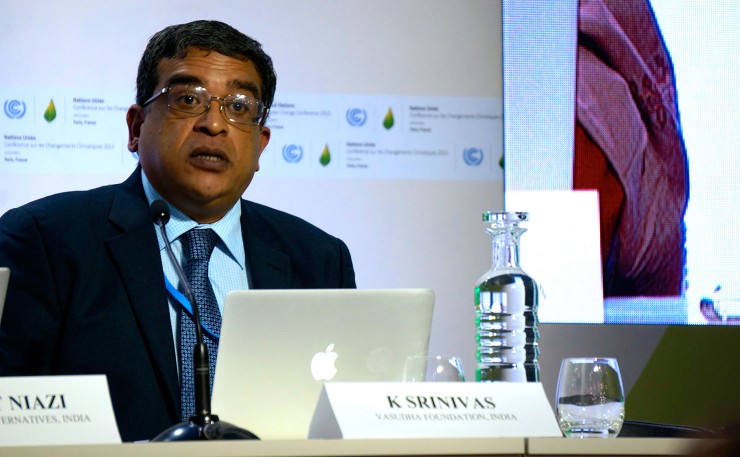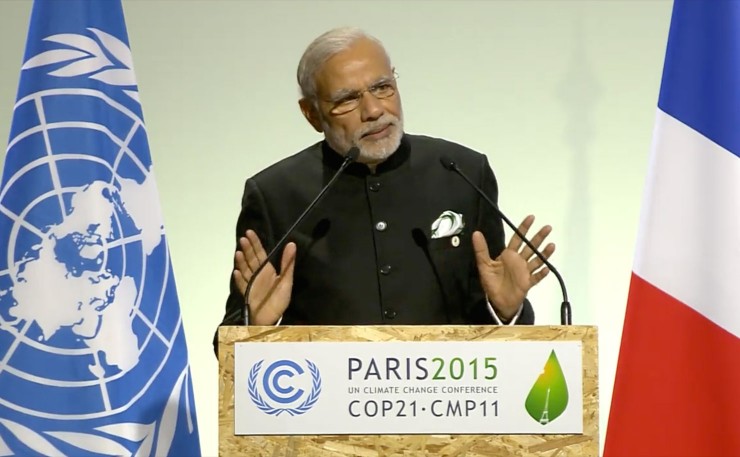India could be a major barrier to an ambitious global agreement on climate change, because it’s sticking to demands rich countries cough up and do the heavy lifting on carbon cuts. Thom Mitchell reports from the Paris climate talks.
As the world’s third largest carbon emitter, and with a population already at 1.25 billion and expected to surpass China’s by 2028, India is among the most important players in the global climate change negotiations underway in Paris this month.
Its emissions are growing sharply, and Prime Minister Narendra Modi doesn’t plan to reverse that trajectory any time soon. According to a recent analysis by the Carbon Action Tracker, a think tank which took a look at India’s pledge ahead of the United Nations negotiations, the country’s emissions (excluding those from land use) will double between 2010 by 2030.
That’s partly because the Indian government has pegged its political pitch to a promise to provide ‘electricity to all’ within 70 years. It’s a big job: leaving aside the rapidly growing population, there’s already 300 million Indians without access to electricity.
So what is India doing to make sure that energy is clean, and what does it want out of the historic climate negotiations underway in Paris? Yesterday in his Leaders Address to the United Nations, Modi was steely in his insistence that rich nations who are historically responsible for causing climate change must be the ones who contribute most to combating it.

“Over the next few days we will decide the fate of this planet; we do so when the consequences of the industrial age powered by fossil fuels are evident, especially on the lives of the poor,” Modi said.
“The prosperous still have a strong carbon footprint and the world’s billions, at the bottom of the development ladder, are seeking space to grow.
“Developed countries must fulfill their responsibility to make clean energy available, equitable and accessible to all the developing world,” he said: “The principle of common but differentiated responsibilities must remain the bedrock of our collective enterprise across all areas… anything else will be morally wrong.”
At a press conference today on the sidelines of the United Nations summit, geared at finding a solution to keep the global average temperature rise below two degrees celsius, a panel of prominent Indian environmentalists largely agreed with the tactics Modi has been deploying.
“India is right now in a position that China was in seven, or maybe 10 years back,” said Srinivas Krishnaswamy, the CEO of Indian green group the Vasudha Foundation. He supports the Modi government’s efforts to provide ‘electricity for all’, along with other fundamentals, and said part of the challenge in doing that with renewables is the need to ensure ‘baseload’ electricity, or a secure and assured supply.
Asked whether nuclear power could provide emissions-free baseload power to support the renewables Krishnaswamy said at this stage it could not, and added his personal view that “nuclear will not be much of an addition in the next 10 to 15 years at least”.
“I think India would be looking at options which would ramp up its electricity production at the earliest, and if you look at the time frame taken for India as against the other fuel sources it would be much longer,” he said.
“The cost of nuclear is also prohibitive, and there’s also the issue of getting the fuel for nuclear.”
Instead, the Indian government is pursuing a massive roll out of new coal mines and coal fired power stations, with the Indian Energy Minister expecting “60-plus [coal]mines in the next five years”.
Notwithstanding this, though, the Modi administration has brought some serious commitments to the Paris climate talks; Carbon Action Tracker rated its pre-submitted plan as being of ‘medium’ ambition, compared to Australia’s ‘inadequate’ targets, for example.
In short, India’s commitments out to 2030 are:
- Achieving 40 per cent renewable electricity.
- Reducing the emissions intensity of its Gross Domestic Product by between 33 and 35 per cent below 2005 levels.
- Creating an additional carbon sink of between 2.5 and 3 billion tonnes of carbon dioxide through afforestation.
- Rolling out 175 GW of renewable energy by 2022.
These targets would have been more ambitious had developed nations provided more of the climate finance Modi is demanding, but as we reported in October, India looks more likely to overshoot its mark than miss it.
While an initial goal of $30 billion in climate finance between 2010 and 2012 has been met, Krishnaswamy said “there’s very little money on the table”; “no clarity on what the post-2020 climate finance regime will look like”; and “certain ambition is linked with [these]means of implementation”. In this context, he said, it would be unreasonable to expect India to do what China has done and nominate a year that its overall emissions will peak.
Rich nations have previously promised to ‘mobilise’ $100 billion annually each year after 2020 (with help from the private sector), and India had actually drafted a more ambitious climate change plan to bring to the Paris summit, but scrapped parts of it at the last minute due to a lack of secured committed finance.

On the opening day of the Paris talks, though, there were promising signs that the money will indeed flow, after a new initiative dubbed ‘Mission Innovation’ was launched. Twenty countries, including Australia, unveiled a multi-billion dollar clean energy fund and committed to doubling research and development investments.
The countries represent 80 per cent of global clean energy R&D, according to the World Resources Institute, so it’s a very significant development. And it’s linked to a separate announcement from a group of 27 private investors spearheaded by Bill Gates who have promised further funds in the billions of dollars will be channeled through an initiative linked to ‘Mission Innovation’, which they’re calling the ‘Breakthrough Energy Coalition’.
For his part, Modi used the first day of the Paris climate talks to co-launch an international alliance geared at promoting solar energy, to act as “as a common platform for cooperation among solar resource rich countries lying fully or practically between the Tropics of Cancer and Capricorn”.
The Director of Energy Finance Studies at the Australasian arm of the Institute for Energy Economics and Financial Analysis, and former senior analyst at Citigroup, Tim Buckley said it would “further boost the efforts of private enterprise and the adoption of green power in India”.
Modi was more florid, declaring that “the sun is the source of all energy, and the world must turn to solar, the power of our future”.
But with India shaping up as the staunchest enforcer of the historical responsibility of developed nations for climate change, and also a massive and growing emitter, western negotiators will be hoping they can thrash out a deal Modi will accept before the sun sets on the world’s chances of keeping global warming below two degrees celsius.
Donate To New Matilda
New Matilda is a small, independent media outlet. We survive through reader contributions, and never losing a lawsuit. If you got something from this article, giving something back helps us to continue speaking truth to power. Every little bit counts.





